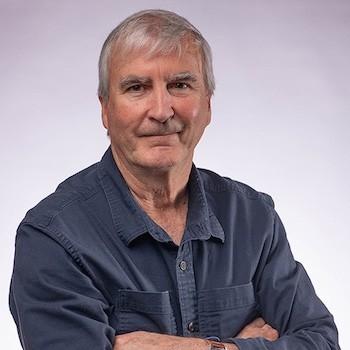In the early 1980s, in a house on Lower College Road, University of Rhode Island alum Edward McSweegan (‘84) studied his way to a Ph.D. in microbiology.
Afterwards, career changes, historical fiction novels and world travel would fill McSweegan’s days. With an undergraduate degree in biology from Boston College, and a master’s degree in microbiology from the University of New Hampshire, McSweegan decided that URI would be his next step.
His routine would consist of walking to Morrill Hall, taking notes for class and then getting up to go instruct a different class in the same building, McSweegan said. He would then spend the rest of the day doing research for various labs.
“All in all, it was a nice balance of learning, teaching and doing,” McSweegan said.
That was not all he was doing, however; he was also the vice president for the Graduate Student Association and the grad representative for the University’s Presidential Transition Committee. His schedule was filled, including Friday nights when he would have meetings for the Faculty Senate Committee.
“We had the unfortunate habit of meeting late on Friday afternoons when I was anxious to get away to a little restaurant now closed down called Casey’s,” he said.
After URI, he went straight into the field, researching in Washington, D.C. for a two-year-long national fellowship. After that, and an 18-month break, he became an American Association for the Advancement of Science diplomacy fellow at the United States Department of State.
Due to his previous knowledge of Russian from various classes at URI, he was able to get a position at the science and technology desk developing a pact between the U.S. and Poland as well as additional agreements between Hungary and the Soviet Union.
Finally settling down, McSweegan took a job at the National Institutes of Health in Bethesda, Maryland. To end his professional science career, he worked for famous virologist Robert Gallo in Baltimore, Maryland at his company, Global Virus Network.
Deciding to pivot his career, he began writing, which was a different path from his past endeavors. He began by writing a monthly column for “The Capital” newspaper based out of Anapolis on infectious diseases for six years.
“It’s a quantum leap from academic writing to fiction writing,” McSweegan said. “Just imagine the reverse. Imagine Nora Roberts or J.K. Rowling, trying to write something for the New England Journal of Medicine or the Journal of Infectious Diseases.”
In the process of writing a novel, the start is research, McSweegan said. He would go online, to libraries, find special collections and look for original sources full of information he needed for specific details.
Research may be important, but the key to completing a good novel is having it read, McSweegan said. He would read his stories to other people and asking for feedback and criticism.
“You may write in isolation, but you can’t publish in isolation,” he said.
His next book is completely different from the historical fiction pieces he has written in the past and he describes this one as a thrilling contemporary murder-mystery.
“This is new territory for me,” McSweegan said. “So I may get lost in it.”
With a life full of twists and turns, science, literature and visits to over three dozen countries world-wide, McSweegan’s life is an example of what a URI alum can achieve.
Anybody interested in learning more about his latest accomplishments and staying up to date on his newest releases can visit edwardmcsweegan.com.

